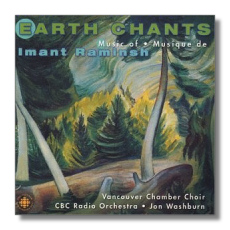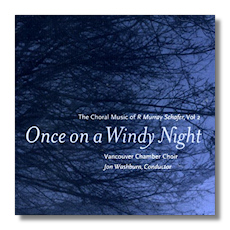
The Internet's Premier Classical Music Source
Related Links
-
Raminsh Reviews
Schafer Reviews - Latest Reviews
- More Reviews
-
By Composer
-
Collections
DVD & Blu-ray
Books
Concert Reviews
Articles/Interviews
Software
Audio
Search Amazon
Recommended Links
Site News
 CD Review
CD Review
Vancouver Chamber Choir

Earth Chants
The Choral Music of Imant Raminsh
- Missa Brevis in c minor 1
- Ubi caritas
- Earth Chants 2
- Alleluia, Amen 3
- What Voices in an Unknown Tongue 4
1 Jennie Such, soprano
2 Siri Olesen, soprano
4 Mariateresa Magisano, mezzo-soprano
4 Nicolò Eugelmi, viola
3 Vancouver Children's Choir - Senior Girls' Chorus
1,2,4 Vancouver Chamber Choir
1 CBC Radio Orchestra/Jon Washburn
CBC Records SMCD 5219 67:17


Once on a Windy Night
The Choral Music of R. Murray Schafer, Volume 2
- Once on a Windy Night 1
- Seventeen Haiku 2
- Vox Naturae 3
- A Medieval Bestiary 4
1 Aldona McLean, soprano
3 Siri Olesen, soprano
2,3 Jonathan Quick, tenor
3,4 George Roberts, baritone
Vancouver Chamber Choir/Jon Washburn
Grouse Records 10 578:55
Summary for the Busy Executive: Does "wow" suggest anything?
Many argue for Jon Washburn's Vancouver Chamber Choir as the première professional choral ensemble in Canada, and you can easily see good reasons. I've only recently heard their music, and as an enthusiastic choral singer myself, I must disagree. With the demise of the Dale Warland Singers, this is probably the best choral group in North America.
What makes them so good? First, they master all the basics – clear diction, intonation not only within sections but throughout the entire group, unanimity of vowel, sharp attack and rhythm, flexibility of phrase. Added to this is one of the most beautiful blends of sound I've ever heard. The beauty is, to a large extent, achieved not only by the right mix of individual voices, but also by the aforementioned unanimity of vowel. It's as if each singer knows what his or her colleague will do before it happens and then, prior to producing any sound at all, makes sure to fit in. This particular aggregation of singers sounds as if they've been working together for a hundred years.
All of this wouldn't mean much if the group didn't take on repertoire worthy of them. Choral music divides pretty much along easy-moderate-hard fault lines. A lot of choral music, at least in the United States, aims at participants who can barely carry off two parts. Such music wastes a group like this. You might as well keep your Ferrari in the garage. However, Washburn clearly likes challenges and has assembled musicians who can rise to them. Nevertheless, no matter how difficult the music gets, Washburn's chorus always makes it sound natural, fostering the illusion that they're doing hardly anything at all.
Imant Raminsh, born in Latvia, emigrated to Canada. His music as well has crossed many borders, and he enjoys a high reputation among choral people. Even New Orleans (where I live) has heard some of his work. The music has mainly a strong modal flavor, although Raminsh can write just about any way he wants, and for me it varies in quality. Raminsh originally wrote the Missa Brevis for treble choir. I liked it in that form but find something jarring about his arrangement for mixed voices. Stylistically it ranges from modality (and, for Raminsh, "modal" almost always equals "mystical") to an almost-simplistic, baroque-ish harmony. The modal stuff, like the "Kyrie," comes off well. The bright stuff does not, at least not for adult voices. The naïve color of treble voices bridges the stylistic gap. The adults tend to sound brainless in places like the "Gloria."
The program makes fairly clear Raminsh's mystical turn of mind. The "Ubi caritas" unfortunately brings to mind the Duruflé setting, mainly due to the declamation and the predominantly modal character of both. Earth Chants uses Native American poetry. The poetry is knockout stuff. The music seems uneven to me. Some of it, like the first number ("The lands around my dwelling"), comes off as too conventional or somehow not up to the texts. On the other hand, other parts – like "As my eyes search" and "War Song" – soar with real poetry. "Alleluia, Amen," a genuine choral hit, begins with a texture that sounds a bit like Ligeti's Lux aeterna, a close worrying of small intervals for the trebles, and then moves to a Randall-Thompsonish fullness for all voices. I suppose Randall Thompson's "Alleluia" comes to mind first, just from the title, but Raminsh pulls off something of his own. The best work on the program I think the extended What Voices in an Unknown Tongue, for the winning combination of choir and solo viola. One of my favorite choral pieces, Klaus George Roy's very Hindemithian Canticle of the Sun, uses the same forces. They turn out to give a very noble sound and inspiring music, in both instances. The composer sets a text by Canadian artist and diarist Emily Carr. I find the texts (mostly rapture in the presence of nature) somewhat pedestrian and purple on the page, but they inspired some wonderful music. The music lifts them. The fact that Raminsh has fashioned a substantial, almost ten-minute work in a single movement from separate diary entries impresses no end. The choral textures are highly varied (and very beautiful besides), and yet the whole thing hangs together. At times, the music becomes ecstatic, gets your heart to beat to some universal pulse. The interweaving of the viola and especially the solo mezzo (who takes a lead role) just about takes my breath away. Mariateresa Magisano and violist Nicolò Eugelmi raise the already-high level set by Washburn's chorus. The final moments of the work is one long rapture.
I've long admired the music of R. Murray Schafer. He gets stuck with the label "avant-garde," and I guess he is. However, the avant-gardedness of his music impressed me less strongly than its beauty. After all, nothing dates so fast as the merely up-to-date. Schafer, like Raminsh, is drawn to the expression of a pantheistic mysticism. His primary impulse is lyrical and, I would say, painterly. E. E. Cummings once remarked that "In China, the poet is also a painter." In his liner notes to the disc, specifically to the piece "Once on a Windy Night," Schafer reveals something about why he thinks up certain devices:
You want to write a piece about the wind; no easy task. You listen to the wind. But what you write is not the wind, rather a piece of music. Tear it up. Go and listen again. Still it is not the wind that your composition expresses. Is it because you can't hear the wind or because you're afraid to write down what you hear?
We see a certain artistic innocence, or at least directness. Of course Schafer writes a piece of music, despite his protests to the contrary. But there's music and there's music. Do you ever hear anything in the music other than the composer's reaction to the wind, the state of his soul? Do you ever hear the wind itself or something that sounds like the music the wind actually makes? In the final piece, the listener does hear the wind, all done by the human body, including the voice. In a town square, I once came across a man sitting on the grass and drawing a building in front of him in ink. He never once looked at his pad, as his hand drew the building in almost-photographic detail. I get roughly the same sensation from Schafer's "Once on a Windy Night" as I did from looking at that drawing rapidly coming into completion before my eyes.
Schafer, to paraphrase Shakespeare's Falstaff, is not only creative in himself, he is the cause of creation in others. A Japanese choir commissioned Schafer's Seventeen Haiku. Schafer invited the choir members to submit favorite haiku and even to compose their own. He then selected the texts he wanted. A haiku, of course, is a very short form, and thus you might expect a fragmentary work. Schafer, however, confounds expectations by coming up with a tone poem that takes you from sunrise to night. Actually, it reminds me a bit of Strauss's Alpensinfonie, not in idiom of course, but in its "program." Traditional images of water, wind, bamboo, and bells, for example, also help knit things together. It's a wonderful work, filled with new sounds. However, Schafer isn't after novelty but after the essence of what he describes. The new sounds help him capture this. In other words, there's a point, refreshingly made. I particularly like the clatter of wind through bamboo Schafer evokes in the fifth haiku.
Schafer wrote Vox Naturae also for a Japanese chorus. Conceptually, it wins from the other pieces on the program the title Most Complicated. Schafer sets a healthy chunk of Lucretius's De rerum naturae (where Lucretius sets forth his atomic theory of sound), which he analyzes into three aspects: scientific theory, illustration of theory, and Pan and his nymphs and satyrs mocking the human world "from hidden places." Accordingly, Schafer uses three choirs: one on stage (scientific theory – straight declamation); one in the hall (illustrating the theory by how they sing and "distort" the words); one off-stage (Pan and his cohorts). It looks a lot more complicated than it sounds (probably due mainly to the skill of Washburn's singers), and Schafer's own suggestion of Monteverdi as a point of comparison seems right on the money. The effects never call attention to themselves. They always serve the expression of the text.
It's hard for me to have a favorite in this program, but the madrigals of Schafer's Medieval Bestiary charm me out of my socks. It's not the usual faux -Renaissance fa-la-la-ing (although you will hear those syllables), but the work of someone who has really absorbed the spirit of Monteverdi's writing.
The Vancouver Chamber Choir does nothing short of amaze. Be-bop-like sax riffs in the Seventeen Haiku aren't merely tossed off, rather precisely (and insouciantly) articulated. This is a virtuoso group and no kidding. I'm absolutely stunned.
I don't get to see many Canadian CDs south of the border (or the Mason-Dixon line, where I live). You may or may not find them at your local shop. The interested among you can get a discography from the groups website: http://www.vancouverchamberchoir.com.
Copyright © 2003, Steve Schwartz



















